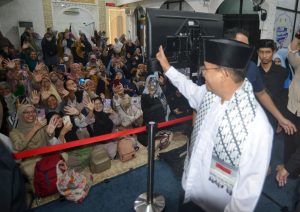Yesterday, Indonesian presidential candidate Anies Baswedan announced that he will file a case at the country’s Constitutional Court contesting the results of last month’s election.
Speaking with reporters yesterday, the former Jakarta governor repeated his past criticisms that the state had not been neutral in the February 14 election, which saw him come in second in a three-way race with Defense Minister Prabowo Subianto and Ganjar Pranowo, the former governor of Central Java.
“We plan to file to the MK for sure but the content is not something that we can disclose,” Anies said, according to a Reuters report, using the Indonesian acronym for the Constitutional Court.
“When we are talking about free and fair elections this also means that the state takes a neutral position toward any contestants and organises the election in a neutral way,” he added. “That has been absent.”
Unofficial vote counts show that Prabowo, a former New Order-era general with a controversial past, won the February 14 election in a single round of voting, with about 58 percent of the vote. According to these unofficial counts, Anies secured around 25 percent of the vote, while Ganjar won 17 percent. The national election commission is expected to announce the official results by March 20.
During the election campaign, Anies positioned himself as the “opposition” candidate against Ganjar, who ran with President Joko “Jokowi” Widodo’s PDI-P. Prabowo enjoyed Jokowi’s presumed backing after appointing his son as his vice-presidential running-mate. He openly criticized the conduct of the election, raising questions about Jokowi’s neutrality and claiming state interference, including the massive distribution of social assistance in key electoral regions.
“If you talk to most people in the general public I think most people will say that the election is over and done with,” Reuters quoted him as saying. “We want to make sure that irregularities don’t go unchecked.”
Anies’ announcement comes after Ganjar’s Indonesian Democratic Party of Struggle (PDI-P) said late last month that it would seek a parliamentary investigation of the conduct of the election and would also file a case with the Constitutional Court. Like Anies, the PDI-P believes that the election was marred “by abuse of power, ranging from legal aspects to the use of state facilities,” as the party’s secretary general Hasto Kristiyanto put it. “If we did not do this comprehensive correction, then what’s the point of having an election in the future?” he said.
Watchdogs and election monitors seem to suggest that the claims of the Anies and Ganjar campaigns have at least some validity – though it remains clear whether they could possibly account for the massive margin of Prabowo’s victory. Indonesia Corruption Watch and KontraS, a human rights group, declared the election to be the least free and fair of any since the fall of Suharto and his New Order administration in 1998.
Corruption Watch/KontraS claimed to have documented 310 cases of alleged fraud such as the mobilization of village heads to support Prabowo’s campaign, vote buying, and the tampering of ballots by polling station workers.
In a report on the election, the Asian Network for Free Elections similarly noted “concerns regarding the quality of various aspects of the overall electoral processes.” These included concerns about the independence of the election commission and the “mobilization and misuse of state resources to sway voter preferences.”

































